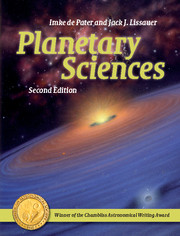Book contents
- Frontmatter
- Contents
- List of Tables
- Preface
- 1 Introduction
- 2 Dynamics
- 3 Solar Heating and Energy Transport
- 4 Planetary Atmospheres
- 5 Planetary Surfaces
- 6 Planetary Interiors
- 7 Magnetic Fields and Plasmas
- 8 Meteorites
- 9 Minor Planets
- 10 Comets
- 11 Planetary Rings
- 12 Extrasolar Planets
- 13 Planet Formation
- Appendix A List of Symbols Used
- Appendix B Acronyms Used
- Appendix C Units and Constants
- Appendix D Periodic Table of Elements
- Appendix E Observing Techniques
- Appendix F Interplanetary Spacecraft
- Appendix G Recent Planetary Images
- References
- Index
- Plate section
8 - Meteorites
- Frontmatter
- Contents
- List of Tables
- Preface
- 1 Introduction
- 2 Dynamics
- 3 Solar Heating and Energy Transport
- 4 Planetary Atmospheres
- 5 Planetary Surfaces
- 6 Planetary Interiors
- 7 Magnetic Fields and Plasmas
- 8 Meteorites
- 9 Minor Planets
- 10 Comets
- 11 Planetary Rings
- 12 Extrasolar Planets
- 13 Planet Formation
- Appendix A List of Symbols Used
- Appendix B Acronyms Used
- Appendix C Units and Constants
- Appendix D Periodic Table of Elements
- Appendix E Observing Techniques
- Appendix F Interplanetary Spacecraft
- Appendix G Recent Planetary Images
- References
- Index
- Plate section
Summary
I could more easily believe two Yankee professors would lie than that stones would fall from heaven.
Attributed (probably incorrectly) to USA President Thomas Jefferson, 1807A meteorite is a rock that has fallen from the sky. It was a meteoroid (or, if it was large enough, an asteroid) before it hit the atmosphere and a meteor while heated to incandescence by atmospheric friction. A meteor that explodes while passing through the atmosphere is termed a bolide. Meteorites that are associated with observations prior to or of the impact are called falls, whereas those simply recognized in the field are referred to as finds.
The study of meteorites has a long and colorful history. Meteorite falls have been observed and recorded for many centuries (Fig. 8.1). The oldest recorded meteorite fall is the Nogata meteorite, which fell in Japan on 19 May 861. Iron meteorites were an important raw material for some primitive societies. However, even during the Enlightenment it was difficult for many people (including scientists and other natural philosophers) to accept that stones could possibly fall from the sky, and reports of meteorite falls were sometimes treated with as much skepticism as UFO ‘sightings’ are given today. The extraterrestrial origin of meteorites became commonly acknowledged following the study of some well-observed and documented falls in Europe around the year 1800. The discovery of the first four asteroids, celestial bodies of sub-planetary size, during the same period added to the conceptual framework that enabled scientists to accept extraterrestrial origins for some rocks.
- Type
- Chapter
- Information
- Planetary Sciences , pp. 337 - 365Publisher: Cambridge University PressPrint publication year: 2010



